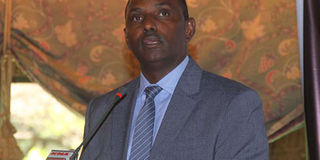Yatani pushes for adoption law review to curb child trafficking

Labour Cabinet Secretary Ukur Yatani addresses delegates during the launch of the Homecare Management Curriculum at Safari Park Hotel, Nairobi, on October 17, 2018. He wants child adoption laws strengthened. PHOTO | FILE | NATION MEDIA GROUP
What you need to know:
- He called for strict regulation of funds disbursed to children rights groups so at to ensure only the credible ones benefit.
- A team has been given one year to review the existing legal, policy and institutional framework for child protection in the country.
Child adoption laws and regulations should be streamlined to curb cases of child trafficking and abuse, Labour Cabinet secretary Ukur Yatani has said.
Speaking during the launch of the Child Welfare Society Steering Committee, which will review the legal framework for the protection of children in Kenya on Friday, Mr Yatani said that children have routinely been abused by those who have been entrusted with their safety.
He accused a corrupt network of children officers, magistrates and lawyers of being involved in child trafficking. “There are policy and legal gaps in adoption, guardianship and foster care which have been abused over the years.
"The appointment of the committee is therefore an effort by the government to ensure that no one is left behind in bettering the lives of children,” he said.
“Policies and frameworks should be developed with an aim of curbing and eliminating child trafficking,” he added.
CARE
The US State Department's report on trafficking in persons ranks Kenya at Tier 2, citing the country's lack of compliance with the minimum standards for elimination of human trafficking.
Countries in Tier 2 category are those that do not fully meet the Trafficking Victims Protection Act’s (TVPA) minimum standards, but are perceived as making significant efforts to comply.
According to the chairperson of the committee set up to review the framework for protection of children in Kenya, Dr Scholastica Omondi, the greatest challenge the country is facing is that the public is ignorant of how child trafficking occurs and called for sustained public education on the issue.
Referring to children in remand, at children homes and those on the streets, the Mr Yatani reiterated that relevant government agencies should collaborate so as to create an enabling environment for them.
DISABILITY
He pointed out that Kenya is doing very well in promoting the welfare of those living with disabilities, and that this was why Kenya and the UK jointly co-hosted the first ever global disability summit in London.
“We must do everything possible to put this country back on track in terms of child protection,” he said.
He urged the committee to work with the Judiciary and Parliament in order to achieve its mandate; and called for strict regulation of funds disbursed to children rights groups so at to ensure only the credible ones benefit.
The committee, which was gazetted on October 19, has been given one year to review the existing legal, policy and institutional framework for child protection in the country.
It aims at ensuring protection of orphans and other vulnerable children as per the country’s Constitution.
LICENCE
The members are Ms Rose Wasike, Mr Joseph Gitau, Mr Peter Molu Ibrae, Mr Anthony Gitahi, Major (Rtd) Iltasayon Neepe, Mr Paul Billy Muhia Ngugi, Ms Irene Mureithi and Mr Bill Rutto.
Last week, the Ministry closed the Good Samaritan Children's Home over allegations of serious malpractices. It is estimated that about 8 million to 10 million children are trafficked and abused annually.
In 2014, Kenya banned all resident and inter-country adoptions (adoption of a Kenyan child by adopters who are non-Kenyans and those who live outside Kenya), and also cancelled licenses for inter-country adoptions.
The objective of the ban was to enable the government to conduct a comprehensive audit of the legal environment, procedures and players involved in adoption.
The ban was also aimed at ensuring robust family tracing and reunification and enhancing local alternative family care and other child protection interventions.





